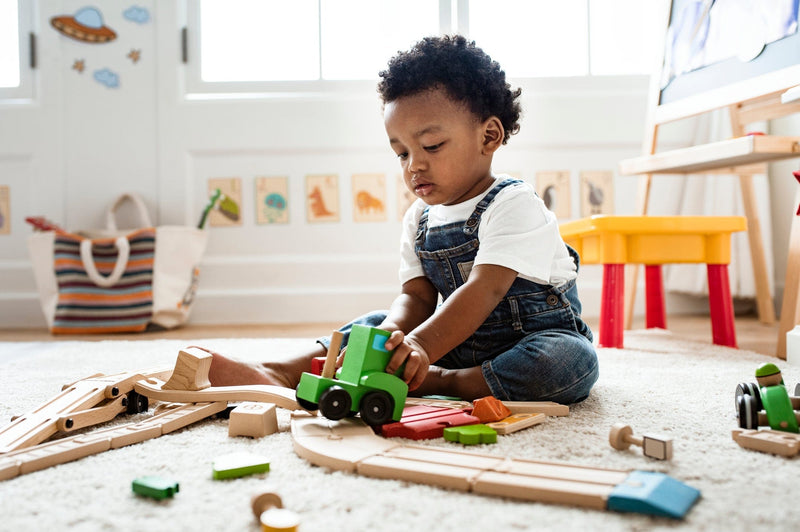Tips for Postpartum Depression & Anxiety
Written by Connor Bringas on February 24, 2023.
It’s no question that birthing a child can come with heavy emotions, including sadness. Many mothers can experience this overwhelming feeling of sadness and other signs and symptoms for prolonged periods. This can be a sign of postpartum depression. While these feelings can be burdensome to new mothers, it’s important to understand that help is available for these symptoms. In this blog, we’ll review some common signs and tips for postpartum depression.
Disclaimer: While we’re going to share some common tips for postpartum depression, we encourage you to seek help from true medical professionals if you’re struggling with any of the signs or symptoms of postpartum depression. This blog will provide general information and should not be used in place of medical advice or a diagnosis of postpartum depression. Medical professionals can help you identify the best treatment plan.
Coping with Postpartum Depression & Anxiety
Table of Contents
- What is postpartum depression?
- What are the signs and symptoms of postpartum depression?
- What helps with postpartum depression and anxiety
- When should I look into other methods like medication to help with postpartum depression and anxiety?
- How to help and support your spouse, friend, sister, or loved one dealing with postpartum depression and anxiety
What is postpartum depression?
As we’ve mentioned, it’s very common for mothers to feel ‘baby blues’ or sadness after giving birth to their child. For some, these feelings will subside in a short time. For others, these feelings can be prolonged and can be a sign of postpartum depression. We’ll further review what these signs may look like. If you’re struggling with feelings of postpartum depression, treatment is available. Talking about these symptoms will be the first step in helping your healthcare provider identify a treatment plan for you.
What are the signs and symptoms of postpartum depression?
While postpartum depression can look and feel different for mothers, there are a few common signs that can indicate a diagnosis of postpartum depression. Symptoms can also range from moderate to severe. The following are some of the common feelings that mothers experience who are struggling with postpartum depression:
- Overwhelming or strong feelings of sadness
- Worry
- Insomnia
- Loss of appetite
- Anger or irritability
- Mood swings
- Difficulty bonding with baby
- Hopelessness
What helps with postpartum depression and anxiety?
Coping with postpartum depression while caring for a newborn can be heavy for new mothers as they navigate and attempt to address their symptoms. It’s important to note that stress and worry about motherhood can also begin during pregnancy. You can read more about dealing with stress while pregnant here.
In addition to seeking medical help for your postpartum depression and anxiety, here are some tips for postpartum anxiety and depression:
Bonding with your newborn
A common challenge for mothers, not just those struggling with diagnosed postpartum depression, is difficulty bonding with their babies early on. Don’t feel guilty or ashamed if this is happening to you. Learning ways to bond with your baby effectively will benefit you both. Holding your baby close can actually release a hormone called oxytocin, which makes you feel more relaxed and happier. Holding your baby, practicing skin-to-skin contact, and singing to your baby can also help promote bonding.
The Tushbaby Carrier can help during baby holding, snuggling, carrying, and feeding. The Tushbaby Carrier will help support your arms and back so that you can hold your baby for longer durations to promote bonding.
Self Care for Postpartum Depression and Anxiety
Establishing a routine can help ensure you’re taking care of yourself. Here are a few things you can add to your new mom daily routine to combat postpartum depression and anxiety:
- Balanced diet: While loss of appetite can be common for women with postpartum depression, ensuring you’re getting adequate nutrition is an important part of self-care.
- Exercise: Exercise can help reduce stress and symptoms of depression. Starting with gentle walks can be a great way to reintroduce exercise after giving birth.
- Rest: Lack of sleep can cause depression symptoms to be more severe. Taking time to rest is important, whether you nap when the baby does or ask a family member to take over for a bit.
- More sun: Getting out in the sunshine can help promote a happier mood. Even if it’s just for a short walk around the block, you can use your Tushbaby Carrier to bring your baby along for some fresh air too.
-
Treat yourself: Taking time to do things you enjoy is important. Lean on the support of friends and family and take some ‘you’ time to watch a favorite show, enjoy a bath, or get back out with friends.
Have a support network to cope with postpartum depression and anxiety
An important part of taking care of yourself is the need to have support from others. Having support from others can do wonders by allowing mothers to cope with their depression and anxiety. Finding a family member or friend to confide in can be critical to having emotional and social support. Even finding a local mom group or online forum can be a great way to create a social network.
When should I look into other methods like medication to help with postpartum depression and anxiety?
If you’re experiencing any symptoms of postpartum depression, don’t wait to seek help from a medical professional. Seeking help early on can help your doctor identify the best treatment plan for you. With about 1 in 7 women struggling with postpartum depression, you’re not alone; help is available.
How to help and support your spouse, friend, sister, or loved one dealing with postpartum depression and anxiety
If you know someone struggling with the signs of postpartum depression, you may be wondering how you can help. It’s normal for those struggling with postpartum depression to not understand the symptoms they’re experiencing. If you recognize that someone you love is displaying signs of postpartum depression, encourage them to get help and follow the tips for dealing with postpartum depression. You can let them know how you can support them, including helping care for the baby so they can care for themselves and get the help they need. Many mothers will also experience postpartum separation anxiety. You can read more about postpartum separation anxiety to be best prepared to help mom adjust while you care for their child.
Tushbaby promotes bonding, which helps with postpartum depression and anxiety. Read more about babywearing safety here.


![Tushbaby photo - Women holding baby using tushbaby gray ::[15109665390658]](http://tushbaby.com/cdn/shop/files/GreyCarrier.webp?v=1747418215)
![Tushbaby photo - Women holding baby using tushbaby gray ::[15109665390658]](http://tushbaby.com/cdn/shop/files/Grey3.webp?v=1748543102)
![Tushbaby photo - Women holding baby using tushbaby gray ::[15109665390658]](http://tushbaby.com/cdn/shop/files/rKeAfN6W.webp?v=1748543102)
![Tushbaby photo - Women holding baby using tushbaby gray ::[15109665390658]](http://tushbaby.com/cdn/shop/files/Grey4_95ede319-844c-41db-96eb-608ec6a3b897.webp?v=1748543102)
![Tushbaby photo - Women holding baby using tushbaby gray ::[15109665390658]](http://tushbaby.com/cdn/shop/files/Grey2.webp?v=1748543102)
![Tushbaby photo - Women holding baby using tushbaby gray ::[15109665390658]](http://tushbaby.com/cdn/shop/files/Grey5.webp?v=1747418215)
![Tushbaby photo - Hip seat carrier,baby carrier hip seat,baby wrap carrier baby carrier wrap,baby carrier,baby wrap carriers,baby carriers,baby wraps,baby sling wrap,baby slings,baby wrap sling,carrier for big baby, toddler carrier, nursing carrier, breastfeeding carrier, diaper bag, baby belt carrier, strapless carrier, big kid carrier, special needs carrier,Tote,Diaper bag,Tote bag,Diaper pad,Changing pad,Pacifier pod,Coin purse,Vegan leather bag,Vegan tote,Vegan baby products,plus sized baby carrier::[15109665390658]](http://tushbaby.com/cdn/shop/files/Grey8.webp?v=1747418215)
![Tushbaby photo - Tushbaby grey holding bottle ::[15109665390658]](http://tushbaby.com/cdn/shop/files/Grey9.webp?v=1747418215)
![Tushbaby photo - Women using tushbaby::[15109665423426]](http://tushbaby.com/cdn/shop/files/BlackColor1.webp?v=1747418215)
![Tushbaby photo - man using tushbaby::[15109665423426]](http://tushbaby.com/cdn/shop/files/BlackColor2.webp?v=1747418215)
![Tushbaby photo - Women using tushbaby::[15109665423426]](http://tushbaby.com/cdn/shop/files/BlackColor3.webp?v=1747418215)
![Tushbaby photo - ::[15109665423426]](http://tushbaby.com/cdn/shop/files/BlackColor4.webp?v=1747418215)
![Tushbaby photo - ::[15109665423426]](http://tushbaby.com/cdn/shop/files/BlackColor5.webp?v=1747418215)
![Tushbaby photo - ::[15109665423426]](http://tushbaby.com/cdn/shop/files/BlackColor6.webp?v=1747418215)
![Tushbaby photo - ::[15109665423426]](http://tushbaby.com/cdn/shop/files/BlackColor7.webp?v=1747418215)
![Tushbaby photo - ::[15109665423426]](http://tushbaby.com/cdn/shop/files/BlackColor9.webp?v=1747418215)
![Tushbaby photo - Women using tushbaby::[15109665521730]](http://tushbaby.com/cdn/shop/files/Black_Gold1_3.webp?v=1747418215)
![Tushbaby photo - Women using tushbaby::[15109665521730]](http://tushbaby.com/cdn/shop/files/Black_Gold2.webp?v=1747418215)
![Tushbaby photo - Women using tushbaby::[15109665521730]](http://tushbaby.com/cdn/shop/files/Black_Gold3.webp?v=1747418215)
![Tushbaby photo - Women using tushbaby::[15109665521730]](http://tushbaby.com/cdn/shop/files/Black_Gold4.webp?v=1747418215)
![Tushbaby photo - Man using tushbaby::[15109665521730]](http://tushbaby.com/cdn/shop/files/Black_Gold5.webp?v=1747418215)
![Tushbaby photo - Women using tushbaby::[15109665521730]](http://tushbaby.com/cdn/shop/files/Black_Gold6.webp?v=1747418215)
![Tushbaby photo - Tushbaby::[15109665521730]](http://tushbaby.com/cdn/shop/files/Black_Gold7.webp?v=1747418215)
![Tushbaby photo - Tushbaby::[15109665521730]](http://tushbaby.com/cdn/shop/files/Black_Gold9.webp?v=1747418215)
![Tushbaby photo - ::[31311822422082]](http://tushbaby.com/cdn/shop/files/VeganLeatherBlack1.webp?v=1747418215)
![Tushbaby photo - ::[31311822422082]](http://tushbaby.com/cdn/shop/files/VeganLeatherBlack3.webp?v=1747418215)
![Tushbaby photo - ::[31311822422082]](http://tushbaby.com/cdn/shop/files/VeganLeatherBlack4.webp?v=1747418215)
![Tushbaby photo - ::[31311822422082]](http://tushbaby.com/cdn/shop/files/VeganLeatherBlack5.webp?v=1747418215)
![Tushbaby photo - ::[31311822422082]](http://tushbaby.com/cdn/shop/files/VeganLeatherBlack7.webp?v=1747418215)
![Tushbaby photo - ::[31311822422082]](http://tushbaby.com/cdn/shop/files/VeganLeatherBlack8.webp?v=1747418215)
![Tushbaby photo - ::[31311822422082]](http://tushbaby.com/cdn/shop/files/VeganLeatherBlack9.webp?v=1747418215)
![Tushbaby photo - ::[40092713287746]](http://tushbaby.com/cdn/shop/files/LiteCharcoal1.webp?v=1747418215)
![Tushbaby photo - ::[40092713287746]](http://tushbaby.com/cdn/shop/files/LiteCharcoal2.webp?v=1747418215)
![Tushbaby photo - ::[40092713287746]](http://tushbaby.com/cdn/shop/files/LiteCharcoal3.webp?v=1747418215)
![Tushbaby photo - ::[40092713287746]](http://tushbaby.com/cdn/shop/files/LiteCharcoal4.webp?v=1747418215)
![Tushbaby photo - ::[40092713287746]](http://tushbaby.com/cdn/shop/files/LiteCharcoal6.webp?v=1747418215)
![Tushbaby photo - ::[40092713287746]](http://tushbaby.com/cdn/shop/files/LiteCharcoal7.webp?v=1747418215)
![Tushbaby photo - ::[40092713287746]](http://tushbaby.com/cdn/shop/files/LiteCharcoal8.webp?v=1747418215)
![Tushbaby photo - ::[40092713320514]](http://tushbaby.com/cdn/shop/files/VelvetSable1.webp?v=1747418215)
![Tushbaby photo - ::[40092713320514]](http://tushbaby.com/cdn/shop/files/VelvetSable3.webp?v=1747418215)
![Tushbaby photo - ::[40092713320514]](http://tushbaby.com/cdn/shop/files/VelvetSable4.webp?v=1747418215)
![Tushbaby photo - ::[40092713320514]](http://tushbaby.com/cdn/shop/files/VelvetSable5.webp?v=1747418215)
![Tushbaby photo - ::[40092713320514]](http://tushbaby.com/cdn/shop/files/VelvetSable6.webp?v=1747418215)
![Tushbaby photo - ::[40092713320514]](http://tushbaby.com/cdn/shop/files/VelvetSable7.webp?v=1747418215)
![Tushbaby photo - ::[40092713320514]](http://tushbaby.com/cdn/shop/files/VelvetSable8.webp?v=1747418215)
![Tushbaby photo - ::[40288698040386]](http://tushbaby.com/cdn/shop/files/VeganLeatherCognac1.webp?v=1747418215)
![Tushbaby photo - ::[40288698040386]](http://tushbaby.com/cdn/shop/files/VeganLeatherCognac3.webp?v=1747418215)
![Tushbaby photo - ::[40288698040386]](http://tushbaby.com/cdn/shop/files/VeganLeatherCognac4.webp?v=1747418215)
![Tushbaby photo - ::[40288698040386]](http://tushbaby.com/cdn/shop/files/VeganLeatherCognac5.webp?v=1747418215)
![Tushbaby photo - ::[40288698040386]](http://tushbaby.com/cdn/shop/files/VeganLeatherCognac6.webp?v=1747418215)
![Tushbaby photo - ::[40288698040386]](http://tushbaby.com/cdn/shop/files/VeganLeatherCognac7.webp?v=1747418215)
![Tushbaby photo - ::[40288698040386]](http://tushbaby.com/cdn/shop/files/VeganLeatherCognac8.webp?v=1747418215)
![Tushbaby photo - ::[40288698040386]](http://tushbaby.com/cdn/shop/files/VeganLeatherCognac9.webp?v=1747418215)
![Tushbaby photo - ::[40288698040386]](http://tushbaby.com/cdn/shop/files/VeganLeatherCognac10.webp?v=1747418215)
![Tushbaby photo - ::[40503457382466]](http://tushbaby.com/cdn/shop/files/Orchid1Square.webp?v=1747418215)
![Tushbaby photo - ::[40503457382466]](http://tushbaby.com/cdn/shop/files/Orchid3Square.webp?v=1747418215)
![Tushbaby photo - ::[40503457382466]](http://tushbaby.com/cdn/shop/files/Orchid4Square.webp?v=1747418215)
![Tushbaby photo - ::[40503457382466]](http://tushbaby.com/cdn/shop/files/Orchid5Square.webp?v=1747418215)
![Tushbaby photo - ::[40503457382466]](http://tushbaby.com/cdn/shop/files/Orchid6Square.webp?v=1747418215)
![Tushbaby photo - ::[40503457382466]](http://tushbaby.com/cdn/shop/files/Orchid7Square.webp?v=1747418215)
![Tushbaby photo - ::[40503457382466]](http://tushbaby.com/cdn/shop/files/Orchid8Square.webp?v=1747418215)
![Tushbaby photo - ::[40503457382466]](http://tushbaby.com/cdn/shop/files/Orchid9Square.webp?v=1747418215)
![Tushbaby photo - ::[40503457382466]](http://tushbaby.com/cdn/shop/files/Orchid10Square.webp?v=1747418215)
![Tushbaby photo - ::[40288993017922]](http://tushbaby.com/cdn/shop/files/VeganLeatherCream1.webp?v=1747418215)
![Tushbaby photo - ::[40288993017922]](http://tushbaby.com/cdn/shop/files/VeganLeatherCream3.webp?v=1747418215)
![Tushbaby photo - ::[40288993017922]](http://tushbaby.com/cdn/shop/files/VeganLeatherCream4.webp?v=1747418215)
![Tushbaby photo - ::[40288993017922]](http://tushbaby.com/cdn/shop/files/VeganLeatherCream5.webp?v=1747418215)
![Tushbaby photo - ::[40288993017922]](http://tushbaby.com/cdn/shop/files/VeganLeatherCream6.webp?v=1747418215)
![Tushbaby photo - ::[40288993017922]](http://tushbaby.com/cdn/shop/files/VeganLeatherCream7.webp?v=1747418215)
![Tushbaby photo - ::[40288993017922]](http://tushbaby.com/cdn/shop/files/VeganLeatherCream8.webp?v=1747418215)
![Tushbaby photo - ::[40288993017922]](http://tushbaby.com/cdn/shop/files/VeganLeatherCream9.webp?v=1747418215)
![Tushbaby photo - ::[40503457415234]](http://tushbaby.com/cdn/shop/files/SnowLeopard1.webp?v=1747418215)
![Tushbaby photo - ::[40503457415234]](http://tushbaby.com/cdn/shop/files/SnowLeopard3.webp?v=1747418215)
![Tushbaby photo - ::[40503457415234]](http://tushbaby.com/cdn/shop/files/SnowLeopard4.webp?v=1747418215)
![Tushbaby photo - ::[40503457415234]](http://tushbaby.com/cdn/shop/files/SnowLeopard5.webp?v=1747418215)
![Tushbaby photo - ::[40503457415234]](http://tushbaby.com/cdn/shop/files/SnowLeopard6.webp?v=1747418215)
![Tushbaby photo - ::[40503457415234]](http://tushbaby.com/cdn/shop/files/SnowLeopard7.webp?v=1747418215)
![Tushbaby photo - ::[40503457415234]](http://tushbaby.com/cdn/shop/files/SnowLeopard8.webp?v=1747418215)
![Tushbaby photo - ::[40503457415234]](http://tushbaby.com/cdn/shop/files/SnowLeopard9.webp?v=1747418215)
![Tushbaby photo - ::[40503457448002]](http://tushbaby.com/cdn/shop/files/Tweed1.-Square.webp?v=1747418215)
![Tushbaby photo - ::[40503457448002]](http://tushbaby.com/cdn/shop/files/Tweed3-Square.webp?v=1747418215)
![Tushbaby photo - ::[40503457448002]](http://tushbaby.com/cdn/shop/files/Tweed4-Square.webp?v=1747418215)
![Tushbaby photo - ::[40503457448002]](http://tushbaby.com/cdn/shop/files/Tweed5-Square.webp?v=1747418215)
![Tushbaby photo - ::[40503457448002]](http://tushbaby.com/cdn/shop/files/Tweed6-Square.webp?v=1747418215)
![Tushbaby photo - ::[40503457448002]](http://tushbaby.com/cdn/shop/files/Tweed8-Square.webp?v=1747418215)
![Tushbaby photo - ::[41633540800578]](http://tushbaby.com/cdn/shop/files/Marble1.webp?v=1747418215)
![Tushbaby photo - ::[41633540800578]](http://tushbaby.com/cdn/shop/files/Marble2.webp?v=1747418215)
![Tushbaby photo - ::[41633540800578]](http://tushbaby.com/cdn/shop/files/Marble4.webp?v=1747418215)
![Tushbaby photo - ::[41633540800578]](http://tushbaby.com/cdn/shop/files/Marble5.webp?v=1747418215)
![Tushbaby photo - ::[41633540800578]](http://tushbaby.com/cdn/shop/files/Marble6.webp?v=1747418215)
![Tushbaby photo - ::[41633540800578]](http://tushbaby.com/cdn/shop/files/Marble7.webp?v=1747418215)
![Tushbaby photo - ::[41633540800578]](http://tushbaby.com/cdn/shop/files/Marble8.webp?v=1747418215)
![Tushbaby photo - ::[41633540800578]](http://tushbaby.com/cdn/shop/files/Marble9.webp?v=1747418215)
![Tushbaby photo - ::[41984257556546]](http://tushbaby.com/cdn/shop/files/Olive1_297431f9-eeb3-411c-bc0e-08d37e703197.webp?v=1747418215)
![Tushbaby photo - ::[41984257556546]](http://tushbaby.com/cdn/shop/files/Olive2_bb6953ff-d61f-471a-b48f-3b36c7dbfb21.webp?v=1747418215)
![Tushbaby photo - ::[41984257556546]](http://tushbaby.com/cdn/shop/files/Olive3_97f99469-33f5-4192-9446-dcdfdbf32e84.webp?v=1747418215)
![Tushbaby photo - ::[41984257556546]](http://tushbaby.com/cdn/shop/files/Olive4_f9c88ddf-96de-476c-bef3-d57f9ddbd5c1.webp?v=1747418215)
![Tushbaby photo - ::[41984257556546]](http://tushbaby.com/cdn/shop/files/Olive5_e2741f35-99ec-4ed5-9307-809ef4ead286.webp?v=1747418215)
![Tushbaby photo - ::[41984257556546]](http://tushbaby.com/cdn/shop/files/Olive6_a66205d9-b767-4224-a04f-6e20597c7c38.webp?v=1747418215)
![Tushbaby photo - ::[41984257556546]](http://tushbaby.com/cdn/shop/files/Olive7_ab97dc70-f0b9-4a70-9137-943b8e3982e1.webp?v=1747418215)
![Tushbaby photo - ::[41984257556546]](http://tushbaby.com/cdn/shop/files/Olive8.webp?v=1747418215)
![Tushbaby photo - ::[41984257556546]](http://tushbaby.com/cdn/shop/files/Olive9.webp?v=1747418215)
![Tushbaby photo - ::[super-image]](http://tushbaby.com/cdn/shop/files/UniversalImage2.webp?v=1747418215)
![Tushbaby photo - ::[super-image] ::[embroidery]](http://tushbaby.com/cdn/shop/files/BlackLeather-Monogram1.webp?v=1747418215)
![Tushbaby photo - ::[super-image] ::[embroidery]](http://tushbaby.com/cdn/shop/files/Orchid-Monogram.webp?v=1747418215)
![Tushbaby photo - Women holding baby using tushbaby gray ::[15109665390658]](http://tushbaby.com/cdn/shop/files/GreyCarrier_160x.webp?v=1747418215)
![Tushbaby photo - Women holding baby using tushbaby gray ::[15109665390658]](http://tushbaby.com/cdn/shop/files/Grey3_160x.webp?v=1748543102)
![Tushbaby photo - Women holding baby using tushbaby gray ::[15109665390658]](http://tushbaby.com/cdn/shop/files/rKeAfN6W_160x.webp?v=1748543102)
![Tushbaby photo - Women holding baby using tushbaby gray ::[15109665390658]](http://tushbaby.com/cdn/shop/files/Grey4_95ede319-844c-41db-96eb-608ec6a3b897_160x.webp?v=1748543102)
![Tushbaby photo - Women holding baby using tushbaby gray ::[15109665390658]](http://tushbaby.com/cdn/shop/files/Grey2_160x.webp?v=1748543102)
![Tushbaby photo - Women holding baby using tushbaby gray ::[15109665390658]](http://tushbaby.com/cdn/shop/files/Grey5_160x.webp?v=1747418215)
![Tushbaby photo - Hip seat carrier,baby carrier hip seat,baby wrap carrier baby carrier wrap,baby carrier,baby wrap carriers,baby carriers,baby wraps,baby sling wrap,baby slings,baby wrap sling,carrier for big baby, toddler carrier, nursing carrier, breastfeeding carrier, diaper bag, baby belt carrier, strapless carrier, big kid carrier, special needs carrier,Tote,Diaper bag,Tote bag,Diaper pad,Changing pad,Pacifier pod,Coin purse,Vegan leather bag,Vegan tote,Vegan baby products,plus sized baby carrier::[15109665390658]](http://tushbaby.com/cdn/shop/files/Grey8_160x.webp?v=1747418215)
![Tushbaby photo - Tushbaby grey holding bottle ::[15109665390658]](http://tushbaby.com/cdn/shop/files/Grey9_160x.webp?v=1747418215)
![Tushbaby photo - Women using tushbaby::[15109665423426]](http://tushbaby.com/cdn/shop/files/BlackColor1_160x.webp?v=1747418215)
![Tushbaby photo - man using tushbaby::[15109665423426]](http://tushbaby.com/cdn/shop/files/BlackColor2_160x.webp?v=1747418215)
![Tushbaby photo - Women using tushbaby::[15109665423426]](http://tushbaby.com/cdn/shop/files/BlackColor3_160x.webp?v=1747418215)
![Tushbaby photo - ::[15109665423426]](http://tushbaby.com/cdn/shop/files/BlackColor4_160x.webp?v=1747418215)
![Tushbaby photo - ::[15109665423426]](http://tushbaby.com/cdn/shop/files/BlackColor5_160x.webp?v=1747418215)
![Tushbaby photo - ::[15109665423426]](http://tushbaby.com/cdn/shop/files/BlackColor6_160x.webp?v=1747418215)
![Tushbaby photo - ::[15109665423426]](http://tushbaby.com/cdn/shop/files/BlackColor7_160x.webp?v=1747418215)
![Tushbaby photo - ::[15109665423426]](http://tushbaby.com/cdn/shop/files/BlackColor9_160x.webp?v=1747418215)
![Tushbaby photo - Women using tushbaby::[15109665521730]](http://tushbaby.com/cdn/shop/files/Black_Gold1_3_160x.webp?v=1747418215)
![Tushbaby photo - Women using tushbaby::[15109665521730]](http://tushbaby.com/cdn/shop/files/Black_Gold2_160x.webp?v=1747418215)
![Tushbaby photo - Women using tushbaby::[15109665521730]](http://tushbaby.com/cdn/shop/files/Black_Gold3_160x.webp?v=1747418215)
![Tushbaby photo - Women using tushbaby::[15109665521730]](http://tushbaby.com/cdn/shop/files/Black_Gold4_160x.webp?v=1747418215)
![Tushbaby photo - Man using tushbaby::[15109665521730]](http://tushbaby.com/cdn/shop/files/Black_Gold5_160x.webp?v=1747418215)
![Tushbaby photo - Women using tushbaby::[15109665521730]](http://tushbaby.com/cdn/shop/files/Black_Gold6_160x.webp?v=1747418215)
![Tushbaby photo - Tushbaby::[15109665521730]](http://tushbaby.com/cdn/shop/files/Black_Gold7_160x.webp?v=1747418215)
![Tushbaby photo - Tushbaby::[15109665521730]](http://tushbaby.com/cdn/shop/files/Black_Gold9_160x.webp?v=1747418215)
![Tushbaby photo - ::[31311822422082]](http://tushbaby.com/cdn/shop/files/VeganLeatherBlack1_160x.webp?v=1747418215)
![Tushbaby photo - ::[31311822422082]](http://tushbaby.com/cdn/shop/files/VeganLeatherBlack3_160x.webp?v=1747418215)
![Tushbaby photo - ::[31311822422082]](http://tushbaby.com/cdn/shop/files/VeganLeatherBlack4_160x.webp?v=1747418215)
![Tushbaby photo - ::[31311822422082]](http://tushbaby.com/cdn/shop/files/VeganLeatherBlack5_160x.webp?v=1747418215)
![Tushbaby photo - ::[31311822422082]](http://tushbaby.com/cdn/shop/files/VeganLeatherBlack7_160x.webp?v=1747418215)
![Tushbaby photo - ::[31311822422082]](http://tushbaby.com/cdn/shop/files/VeganLeatherBlack8_160x.webp?v=1747418215)
![Tushbaby photo - ::[31311822422082]](http://tushbaby.com/cdn/shop/files/VeganLeatherBlack9_160x.webp?v=1747418215)
![Tushbaby photo - ::[40092713287746]](http://tushbaby.com/cdn/shop/files/LiteCharcoal1_160x.webp?v=1747418215)
![Tushbaby photo - ::[40092713287746]](http://tushbaby.com/cdn/shop/files/LiteCharcoal2_160x.webp?v=1747418215)
![Tushbaby photo - ::[40092713287746]](http://tushbaby.com/cdn/shop/files/LiteCharcoal3_160x.webp?v=1747418215)
![Tushbaby photo - ::[40092713287746]](http://tushbaby.com/cdn/shop/files/LiteCharcoal4_160x.webp?v=1747418215)
![Tushbaby photo - ::[40092713287746]](http://tushbaby.com/cdn/shop/files/LiteCharcoal6_160x.webp?v=1747418215)
![Tushbaby photo - ::[40092713287746]](http://tushbaby.com/cdn/shop/files/LiteCharcoal7_160x.webp?v=1747418215)
![Tushbaby photo - ::[40092713287746]](http://tushbaby.com/cdn/shop/files/LiteCharcoal8_160x.webp?v=1747418215)
![Tushbaby photo - ::[40092713320514]](http://tushbaby.com/cdn/shop/files/VelvetSable1_160x.webp?v=1747418215)
![Tushbaby photo - ::[40092713320514]](http://tushbaby.com/cdn/shop/files/VelvetSable3_160x.webp?v=1747418215)
![Tushbaby photo - ::[40092713320514]](http://tushbaby.com/cdn/shop/files/VelvetSable4_160x.webp?v=1747418215)
![Tushbaby photo - ::[40092713320514]](http://tushbaby.com/cdn/shop/files/VelvetSable5_160x.webp?v=1747418215)
![Tushbaby photo - ::[40092713320514]](http://tushbaby.com/cdn/shop/files/VelvetSable6_160x.webp?v=1747418215)
![Tushbaby photo - ::[40092713320514]](http://tushbaby.com/cdn/shop/files/VelvetSable7_160x.webp?v=1747418215)
![Tushbaby photo - ::[40092713320514]](http://tushbaby.com/cdn/shop/files/VelvetSable8_160x.webp?v=1747418215)
![Tushbaby photo - ::[40288698040386]](http://tushbaby.com/cdn/shop/files/VeganLeatherCognac1_160x.webp?v=1747418215)
![Tushbaby photo - ::[40288698040386]](http://tushbaby.com/cdn/shop/files/VeganLeatherCognac3_160x.webp?v=1747418215)
![Tushbaby photo - ::[40288698040386]](http://tushbaby.com/cdn/shop/files/VeganLeatherCognac4_160x.webp?v=1747418215)
![Tushbaby photo - ::[40288698040386]](http://tushbaby.com/cdn/shop/files/VeganLeatherCognac5_160x.webp?v=1747418215)
![Tushbaby photo - ::[40288698040386]](http://tushbaby.com/cdn/shop/files/VeganLeatherCognac6_160x.webp?v=1747418215)
![Tushbaby photo - ::[40288698040386]](http://tushbaby.com/cdn/shop/files/VeganLeatherCognac7_160x.webp?v=1747418215)
![Tushbaby photo - ::[40288698040386]](http://tushbaby.com/cdn/shop/files/VeganLeatherCognac8_160x.webp?v=1747418215)
![Tushbaby photo - ::[40288698040386]](http://tushbaby.com/cdn/shop/files/VeganLeatherCognac9_160x.webp?v=1747418215)
![Tushbaby photo - ::[40288698040386]](http://tushbaby.com/cdn/shop/files/VeganLeatherCognac10_160x.webp?v=1747418215)
![Tushbaby photo - ::[40503457382466]](http://tushbaby.com/cdn/shop/files/Orchid1Square_160x.webp?v=1747418215)
![Tushbaby photo - ::[40503457382466]](http://tushbaby.com/cdn/shop/files/Orchid3Square_160x.webp?v=1747418215)
![Tushbaby photo - ::[40503457382466]](http://tushbaby.com/cdn/shop/files/Orchid4Square_160x.webp?v=1747418215)
![Tushbaby photo - ::[40503457382466]](http://tushbaby.com/cdn/shop/files/Orchid5Square_160x.webp?v=1747418215)
![Tushbaby photo - ::[40503457382466]](http://tushbaby.com/cdn/shop/files/Orchid6Square_160x.webp?v=1747418215)
![Tushbaby photo - ::[40503457382466]](http://tushbaby.com/cdn/shop/files/Orchid7Square_160x.webp?v=1747418215)
![Tushbaby photo - ::[40503457382466]](http://tushbaby.com/cdn/shop/files/Orchid8Square_160x.webp?v=1747418215)
![Tushbaby photo - ::[40503457382466]](http://tushbaby.com/cdn/shop/files/Orchid9Square_160x.webp?v=1747418215)
![Tushbaby photo - ::[40503457382466]](http://tushbaby.com/cdn/shop/files/Orchid10Square_160x.webp?v=1747418215)
![Tushbaby photo - ::[40288993017922]](http://tushbaby.com/cdn/shop/files/VeganLeatherCream1_160x.webp?v=1747418215)
![Tushbaby photo - ::[40288993017922]](http://tushbaby.com/cdn/shop/files/VeganLeatherCream3_160x.webp?v=1747418215)
![Tushbaby photo - ::[40288993017922]](http://tushbaby.com/cdn/shop/files/VeganLeatherCream4_160x.webp?v=1747418215)
![Tushbaby photo - ::[40288993017922]](http://tushbaby.com/cdn/shop/files/VeganLeatherCream5_160x.webp?v=1747418215)
![Tushbaby photo - ::[40288993017922]](http://tushbaby.com/cdn/shop/files/VeganLeatherCream6_160x.webp?v=1747418215)
![Tushbaby photo - ::[40288993017922]](http://tushbaby.com/cdn/shop/files/VeganLeatherCream7_160x.webp?v=1747418215)
![Tushbaby photo - ::[40288993017922]](http://tushbaby.com/cdn/shop/files/VeganLeatherCream8_160x.webp?v=1747418215)
![Tushbaby photo - ::[40288993017922]](http://tushbaby.com/cdn/shop/files/VeganLeatherCream9_160x.webp?v=1747418215)
![Tushbaby photo - ::[40503457415234]](http://tushbaby.com/cdn/shop/files/SnowLeopard1_160x.webp?v=1747418215)
![Tushbaby photo - ::[40503457415234]](http://tushbaby.com/cdn/shop/files/SnowLeopard3_160x.webp?v=1747418215)
![Tushbaby photo - ::[40503457415234]](http://tushbaby.com/cdn/shop/files/SnowLeopard4_160x.webp?v=1747418215)
![Tushbaby photo - ::[40503457415234]](http://tushbaby.com/cdn/shop/files/SnowLeopard5_160x.webp?v=1747418215)
![Tushbaby photo - ::[40503457415234]](http://tushbaby.com/cdn/shop/files/SnowLeopard6_160x.webp?v=1747418215)
![Tushbaby photo - ::[40503457415234]](http://tushbaby.com/cdn/shop/files/SnowLeopard7_160x.webp?v=1747418215)
![Tushbaby photo - ::[40503457415234]](http://tushbaby.com/cdn/shop/files/SnowLeopard8_160x.webp?v=1747418215)
![Tushbaby photo - ::[40503457415234]](http://tushbaby.com/cdn/shop/files/SnowLeopard9_160x.webp?v=1747418215)
![Tushbaby photo - ::[40503457448002]](http://tushbaby.com/cdn/shop/files/Tweed1.-Square_160x.webp?v=1747418215)
![Tushbaby photo - ::[40503457448002]](http://tushbaby.com/cdn/shop/files/Tweed3-Square_160x.webp?v=1747418215)
![Tushbaby photo - ::[40503457448002]](http://tushbaby.com/cdn/shop/files/Tweed4-Square_160x.webp?v=1747418215)
![Tushbaby photo - ::[40503457448002]](http://tushbaby.com/cdn/shop/files/Tweed5-Square_160x.webp?v=1747418215)
![Tushbaby photo - ::[40503457448002]](http://tushbaby.com/cdn/shop/files/Tweed6-Square_160x.webp?v=1747418215)
![Tushbaby photo - ::[40503457448002]](http://tushbaby.com/cdn/shop/files/Tweed8-Square_160x.webp?v=1747418215)
![Tushbaby photo - ::[41633540800578]](http://tushbaby.com/cdn/shop/files/Marble1_160x.webp?v=1747418215)
![Tushbaby photo - ::[41633540800578]](http://tushbaby.com/cdn/shop/files/Marble2_160x.webp?v=1747418215)
![Tushbaby photo - ::[41633540800578]](http://tushbaby.com/cdn/shop/files/Marble4_160x.webp?v=1747418215)
![Tushbaby photo - ::[41633540800578]](http://tushbaby.com/cdn/shop/files/Marble5_160x.webp?v=1747418215)
![Tushbaby photo - ::[41633540800578]](http://tushbaby.com/cdn/shop/files/Marble6_160x.webp?v=1747418215)
![Tushbaby photo - ::[41633540800578]](http://tushbaby.com/cdn/shop/files/Marble7_160x.webp?v=1747418215)
![Tushbaby photo - ::[41633540800578]](http://tushbaby.com/cdn/shop/files/Marble8_160x.webp?v=1747418215)
![Tushbaby photo - ::[41633540800578]](http://tushbaby.com/cdn/shop/files/Marble9_160x.webp?v=1747418215)
![Tushbaby photo - ::[41984257556546]](http://tushbaby.com/cdn/shop/files/Olive1_297431f9-eeb3-411c-bc0e-08d37e703197_160x.webp?v=1747418215)
![Tushbaby photo - ::[41984257556546]](http://tushbaby.com/cdn/shop/files/Olive2_bb6953ff-d61f-471a-b48f-3b36c7dbfb21_160x.webp?v=1747418215)
![Tushbaby photo - ::[41984257556546]](http://tushbaby.com/cdn/shop/files/Olive3_97f99469-33f5-4192-9446-dcdfdbf32e84_160x.webp?v=1747418215)
![Tushbaby photo - ::[41984257556546]](http://tushbaby.com/cdn/shop/files/Olive4_f9c88ddf-96de-476c-bef3-d57f9ddbd5c1_160x.webp?v=1747418215)
![Tushbaby photo - ::[41984257556546]](http://tushbaby.com/cdn/shop/files/Olive5_e2741f35-99ec-4ed5-9307-809ef4ead286_160x.webp?v=1747418215)
![Tushbaby photo - ::[41984257556546]](http://tushbaby.com/cdn/shop/files/Olive6_a66205d9-b767-4224-a04f-6e20597c7c38_160x.webp?v=1747418215)
![Tushbaby photo - ::[41984257556546]](http://tushbaby.com/cdn/shop/files/Olive7_ab97dc70-f0b9-4a70-9137-943b8e3982e1_160x.webp?v=1747418215)
![Tushbaby photo - ::[41984257556546]](http://tushbaby.com/cdn/shop/files/Olive8_160x.webp?v=1747418215)
![Tushbaby photo - ::[41984257556546]](http://tushbaby.com/cdn/shop/files/Olive9_160x.webp?v=1747418215)
![Tushbaby photo - ::[super-image]](http://tushbaby.com/cdn/shop/files/UniversalImage2_160x.webp?v=1747418215)
![Tushbaby photo - ::[super-image] ::[embroidery]](http://tushbaby.com/cdn/shop/files/BlackLeather-Monogram1_160x.webp?v=1747418215)
![Tushbaby photo - ::[super-image] ::[embroidery]](http://tushbaby.com/cdn/shop/files/Orchid-Monogram_160x.webp?v=1747418215)







Leave a comment